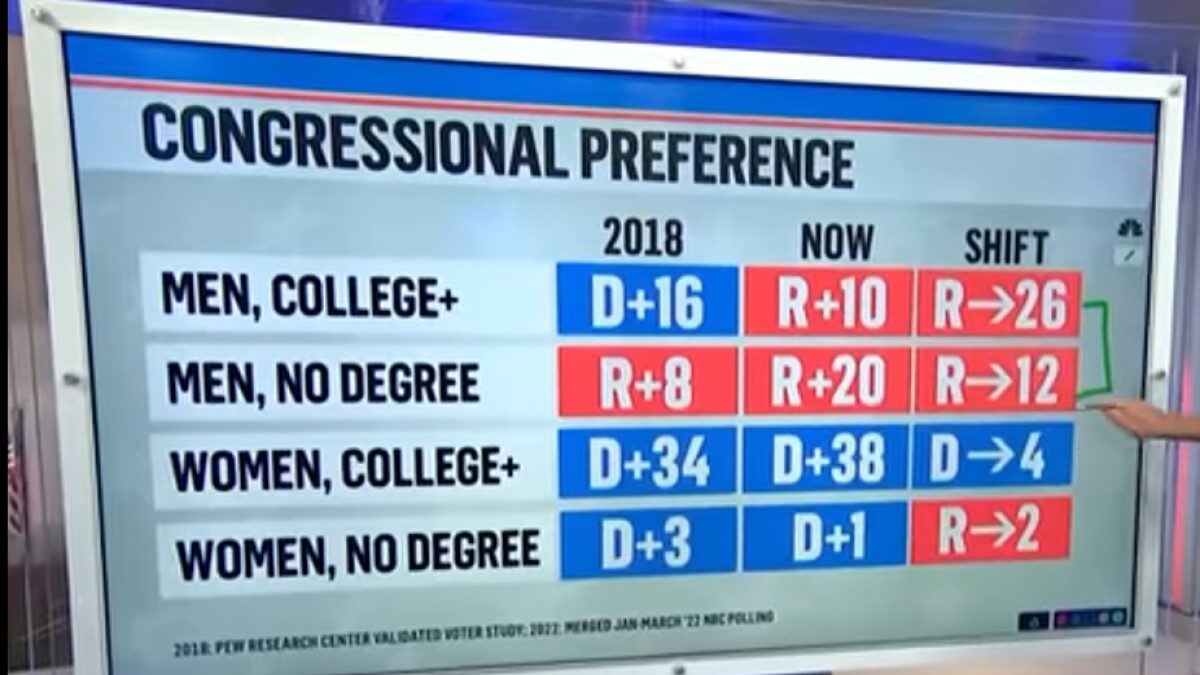NBC News recently compared several polls to find huge shifts from Democrats to Republicans in 2022 midterm voter preferences. The big exception to these shifts across many demographics was college-educated women, who in NBC’s aggregation showed even stronger support for Democrats now than ahead of the last midterm election.
Here’s the key graphic, which zoomed around social media Sunday, and below that the NBC segment.
In trying to understand what might account for this, it’s important to note what we don’t know about these numbers. The two publicly available 2022 NBC polling releases that presumably went into NBC’s aggregation here don’t disclose a key datapoint: The likely vote by marital status. And that datapoint is very important for this discussion.
That’s because, historically, married women tend to vote Republican. Single women tend to vote Democrat, in proportions that appear to be sharply increasing. Strikingly, “Among unmarried voters, women were more supportive of Democratic candidates in 2018 than they had been of Hillary Clinton in 2016,” Pew reported.
The 2018 Pew data NBC used for its comparison showed married women were about evenly likely to vote for Donald Trump as for Joe Biden, narrowing the historic trend of married women breaking Republican by a good margin.
“[T]he gender gap between Democrats and Republicans is actually a marriage gap,” noted columnist Mona Charen in 2014, another midterm year. “Single women vote disproportionately for Democrats and married women vote by a comfortable margin for Republicans. The decline of marriage inclines more women to vote Democrat.”
If unmarried women are inclined to vote Democrat, are college-educated women more likely to be single? Not historically. In the United States, more education has for a long time correlated with higher marital rates. Here’s a 2021 chart from Pew showing that college-educated women are still more likely to be “partnered” — a term that includes cohabiting and married women — than their single counterparts.
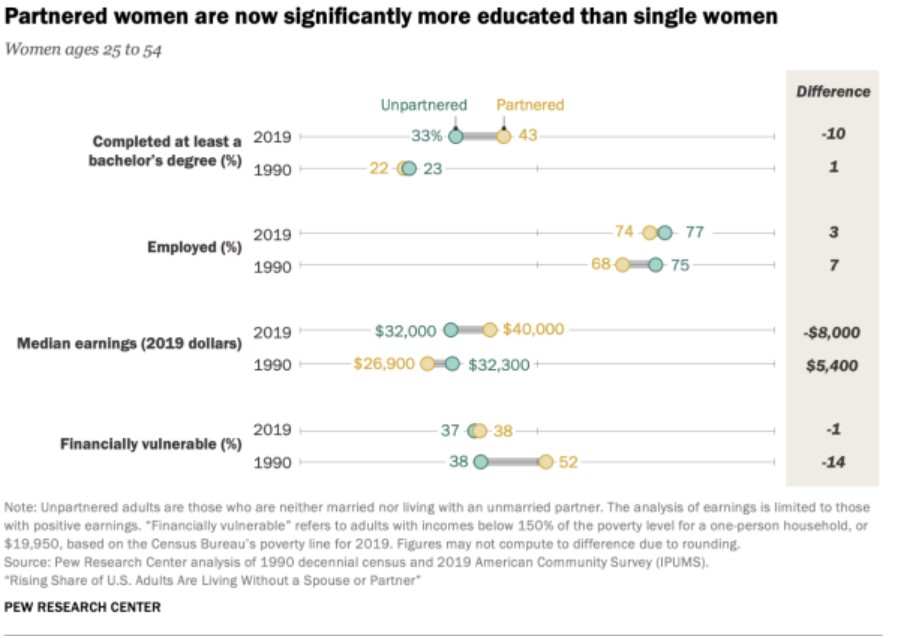
But both American college-graduates and non-college-graduates are increasingly less likely to be married in general. Pre-lockdowns, “marriage rates among the middle class have declined significantly over the past 40 years and have now fallen below those in the top income quintile.” Lockdowns appear to have amplified this pre-existing trend. A late 2021 report showed that both college graduates and non-college graduates are less likely to be married or have children nowadays.
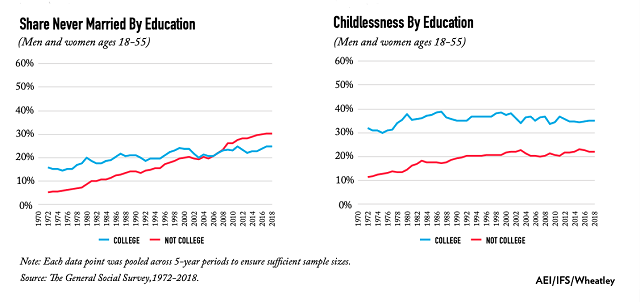
Americans have become even more likely to delay marriage, which in turn delays childbearing and results in greater gaps between the family size women want and the one they end up with: “delayed marriage and childbirth are preventing more women from having any children at all.”
Again, American society seems to be reducing marriage and childbearing as a whole, but this seems to affect Democrat voters more: “since COVID-19 hit, Republicans have witnessed a greater increase in their desire to marry than Democrats and Independents.” Republicans were the only political group that responded to Covid with a greater desire for children.
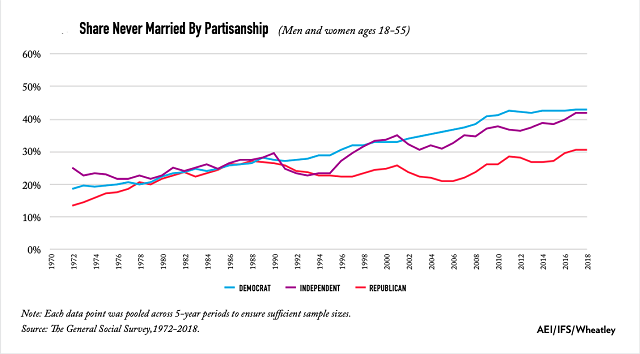
So singlehood, a general predictor among women of increased vote share for Democrats, is rising, a trend that is likely to increase. Although we don’t have the underlying NBC polling numbers to confirm this, it seems likely this is a large explanatory factor for the college-educated women increasing support for Democrats.
Beyond the obvious fact that big government functions for some single women as a husband substitute, at least financially, it’s also true that women respond more strongly than men to emotional arguments of harm and victimhood of the kind that the Democrat Party of today specializes in. Women are also on the forefront of making the leftist kind of emotional “grievance politics” arguments in both academia and the public square, as Richard Hanania and others have noted.
Women are also more susceptible to emotional harm than men, and to sympathy for that harm. On the flip side, women also find a great amount of satisfaction and joy in the “emotional labor” of relationship-building that comprises marriage and family formation.
Growing families makes women happy, and failing to form families makes women (and men) sad. Given the high and increasing rates of failed family formation in the United States, and we have a recipe for many upset women potentially taking out their private grievances on politics.
This is confirmed by other datapoints. For example, Pew found in 2020 that more than half of white women who identified as political liberals had been diagnosed by a professional with a mental disorder, such as depression or anxiety.
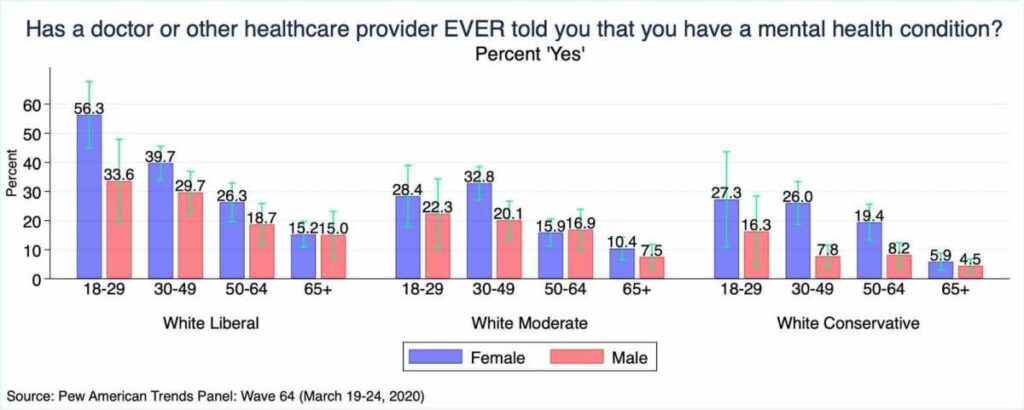
In that 2021 AEI/IFS/Wheatley survey, college graduates were only 4 points more likely to express a desire for marriage than those who didn’t graduate college, a serious decline. This may also indicate a current weakness in the “married women vote Republican” historical trend, especially when combined with the wild partisanship and feminization of college campuses today.
In 2018, according to the Pew data, college graduates — of both sexes — voted for Biden over Trump by a 26-point margin. Much of the male portion of that group is ruing their Biden votes, as the new NBC numbers show. So why are lots of men willing to admit that they were wrong in 2020, while the college-educated women as a group are not only not sharing regrets but doubling down?
My answer — and it has been latent within this discussion the entire time — is feminism. Not just the ideology, but how that ideology has become systematically embedded within American culture since the 1960s. Just consider the context here: college degrees.
Women have been earning more bachelor’s degrees than men have since 1982. From 1982 to 2013, women earned 10 million more degrees than men did. Not surprisingly, women dominate even more the social science fields that incubate leftist political extremism.
It’s well-documented that most colleges now function more as political grooming and social signaling centers than centers of learning. College graduates have for some time demonstrated, on average, no intellectual development from attending college, while college attendance now does correlate with a massive increase in affiliation with the Democrat Party.
At the same time colleges have become essentially academically worthless, if not toxic, they have become saturated with women, and have increasingly marketed and reorganized themselves in feminine terms. The feminization of our culture led by this academic dominance has fueled popular and pervasive messages of cruel and unrestrained female domination of men, rather than the loving cooperation with men that marriage and family encourage. “The End of Men.” “Anything boys can do, girls can do better.” “Girlboss.” “Lean In.”
Cant like this has been engrained into many women’s very identities today, and purposely, by our deeply feminized education and cultural institutions. By contrast, overfeminization is, naturally, inherently unattractive to most men.
So besides their higher disagreeableness as a sex it’s also culturally easier for men to admit they were wrong about who they voted for in 2020. They’re told they’re wrong and dumb constantly, and most men put up with it with astonishing tameness.
But women are not often told they’re wrong about something, if ever. Generally, women are constantly praised for being “strong” and “brave,” even when doing something cruel like severing their children from their own father for complaints that usually don’t rise to the level of adultery or abuse.
And if college-educated women admit they were wrong about Trump and Biden in 2020, where does it stop? Once “fierce women” admit they could be wrong about something so big as their selection of the president of the formerly free world, that opens the door for being wrong about other big things that contradict their conception of always being right to follow their feelings.
Those could include questions like: Does feminism make women unhappy? What about less marriageable?
